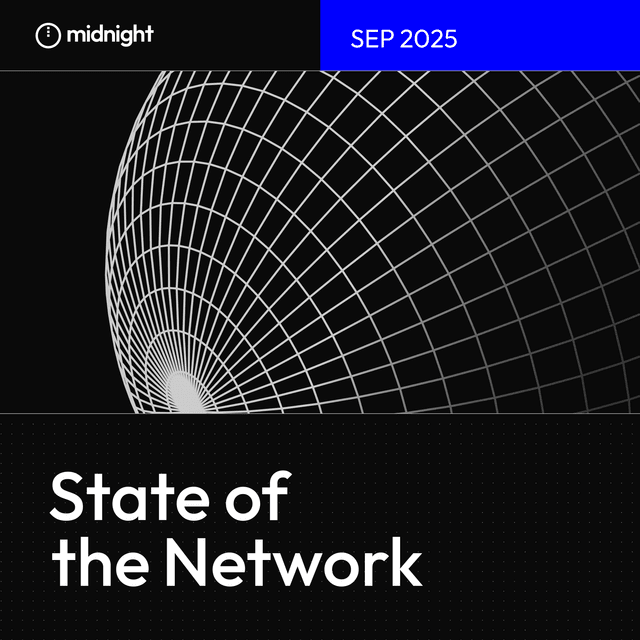Glacier Drop claims update
Claims for the Glacier Drop now exceed 2.5 billion NIGHT tokens in the first phase, representing more than 10% of the 24 billion NIGHT tokens available to claim.
There’s still some time left to make a Glacier Drop claim, you can check eligibility and make a claim at midnight.gd. If you’re looking for more support making a claim, go to the Glacier Drop FAQs.
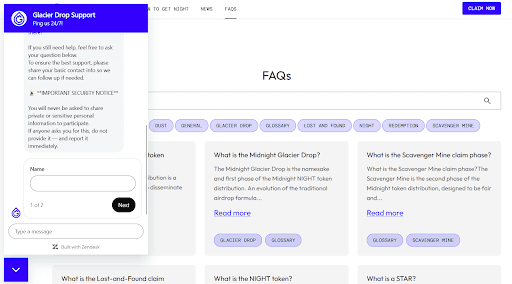
There have been a number of technical updates to the Glacier Drop portal since the launch on August 5. For a detailed summary of technical changes, read the NIGHT claim portal technical updates blog, and check on the regularly updated list of wallet and address compatibility.
Building a collaborative foundation for web3
A new research report from The Block, developed in collaboration with the Midnight Foundation, explains how selective disclosure privacy combined with chain-agnostic design offers a framework for the future of web3.
The report, Beyond Tribalism and Transparency: The Case for a Collaborative Crypto Future, explains how tribalism and fragmentation among blockchain networks and communities mirrors the early internet's isolated networks, which limited growth. The historical solutions were developments that established open, interoperable standards like TCP/IP, then adding essential privacy and security protocols like TLS to enable widespread, secure use.
This combined approach, adding both interoperability and programmable privacy, is central to the design of Midnight. The network is built to function as a privacy layer for Web3, connecting ecosystems rather than competing as another siloed platform. Glacier Drop is the first step to developing a collaborative ecosystem across networks and communities, inviting users from eight major blockchains to demonstrate a collaborative path forward for sustainable growth that benefits all communities.
Look for more highlights from the report on the blog in the coming weeks.
Network pulse
Key on-chain metrics from the past month indicate significant growth in network activity and developer adoption. The data shows a healthy expansion in the number of block producers, alongside a substantial increase in both new smart contract deployments and user interactions on the network
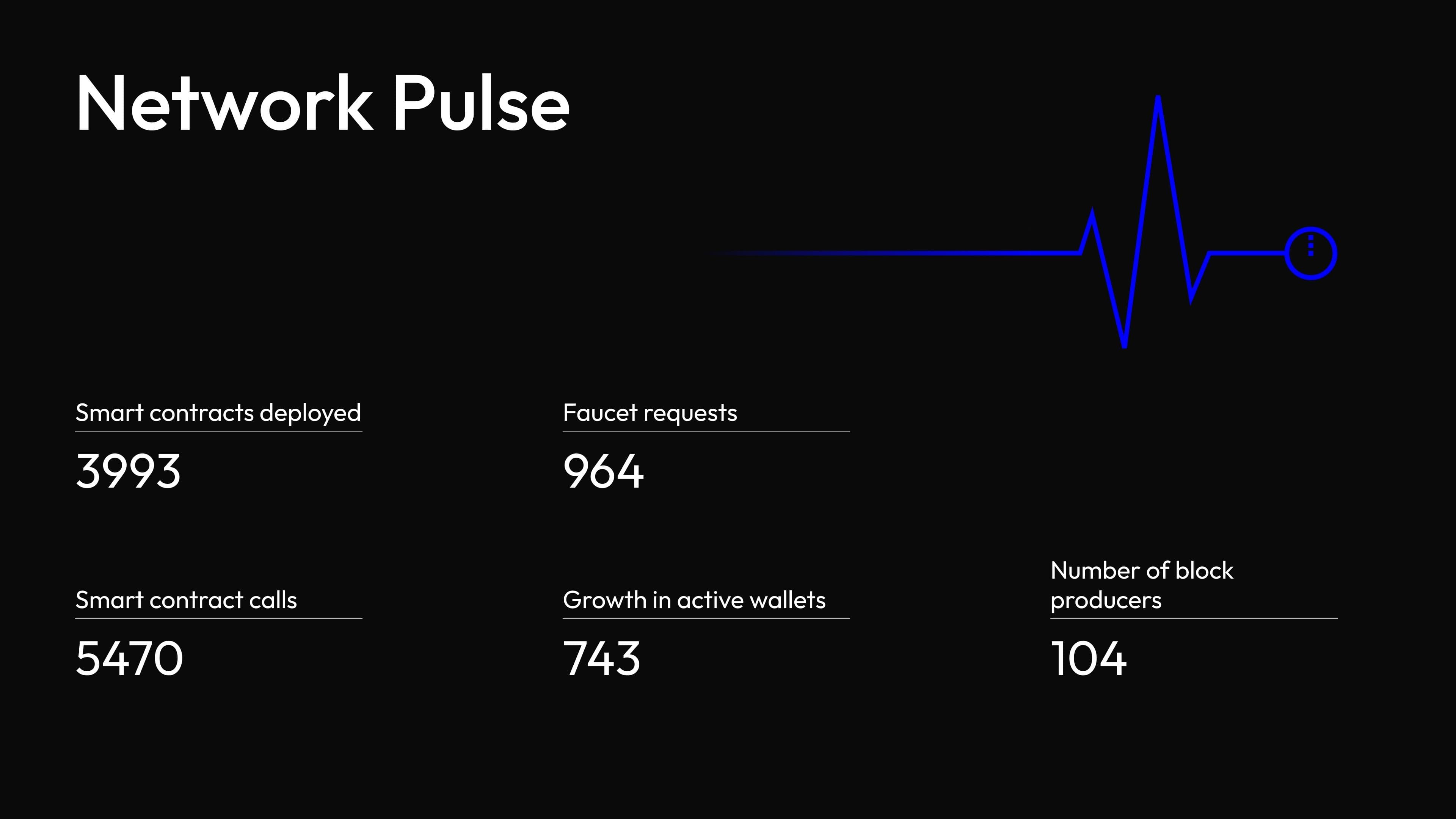
Note: These show growth trends across the previous two months. This September update shows changes in network metrics from July to August.
Ecosystem
Webisoft
The Midnight Foundation has partnered with Webisoft to develop an institutional-grade dark pool trading platform. This project uses Midnight’s privacy technology to address a challenge for institutional finance where the transparency of public blockchains creates execution risk. The resulting decentralized exchange (DEX) will enable the confidential execution of large orders. This model preserves confidentiality until after the transaction is complete, ensuring fair execution without market disruption
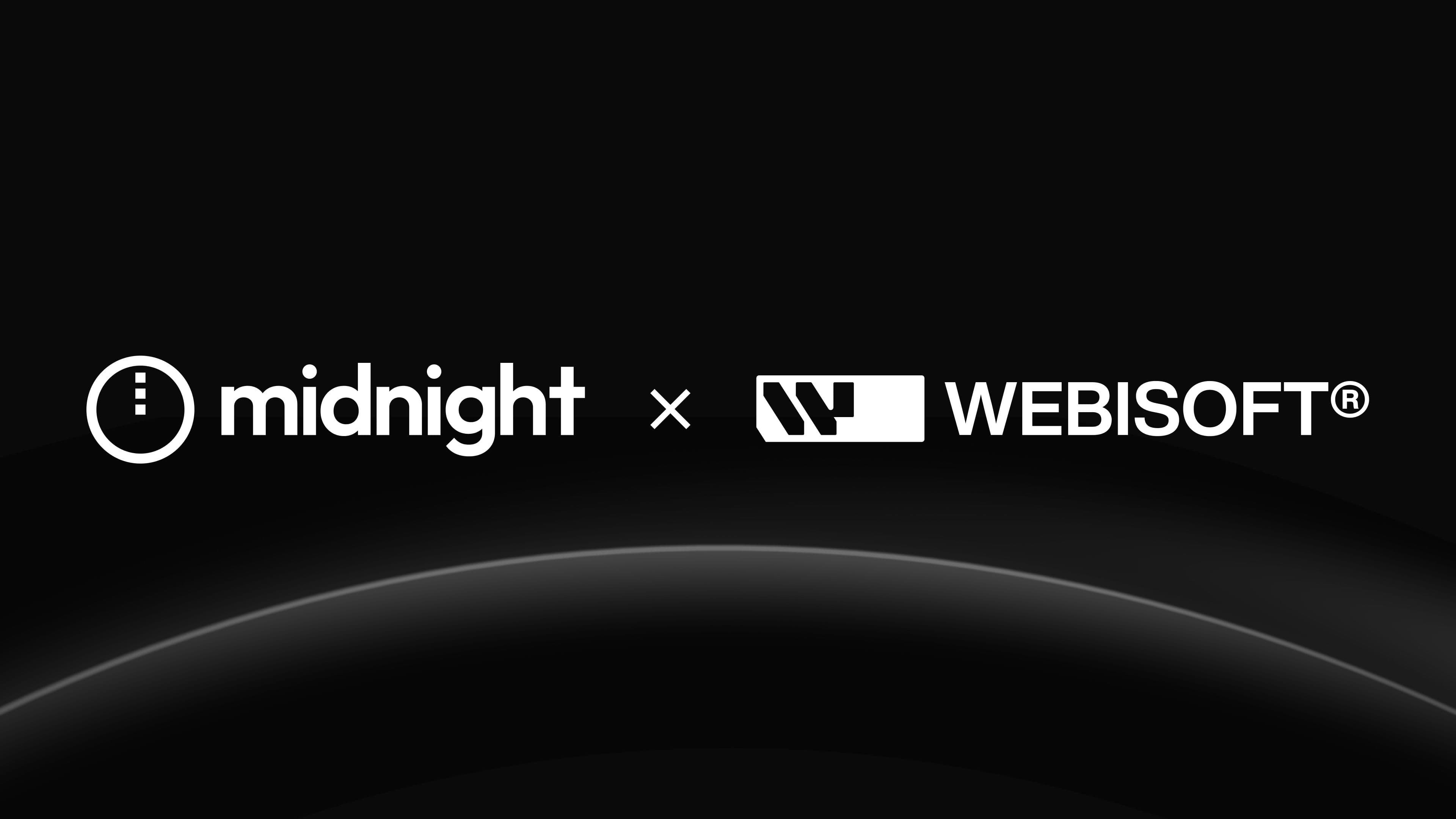
The project will deliver a series of open-source components for developers, all released under an Apache 2.0 license. Read the Webisoft ecosystem partnership announcement blog for more details about the modular components and how they will provide a foundation for building other advanced, privacy-focused financial applications.
Hackathons
The developer ecosystem has seen a surge of activity with a series of recent and upcoming hackathons. Events in the past month showcased new applications for private finance, asset tokenization, and decentralized identity. This momentum leads into a busy fall schedule, which includes a virtual hackathon focused on AI and treasury management, and culminates in the largest builder event to date, the Midnight Summit hackathon in November.
Mini DApp hackathon
The recent Mini Dapp hackathon challenged the idea that bigger is better, asking developers to build miniature DApps with maximum impact. The winning projects demonstrated sophisticated financial use cases built on Midnight's privacy technology. The top project, LucentLabs, built a private overcollateralized stablecoin protocol for institutional use, featuring shielded liquidations and off-chain identity verification for compliance. Another winner, Midnight Bank, delivered a confidential banking DApp that supports private transfers and multi-party transaction authorization.
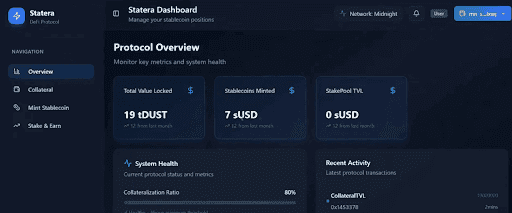
The event also produced a key use case for digital identity and access control. The zkBadge project created a system for issuing verifiable credentials without exposing personal data. The application allows a trusted issuer to generate a "zkBadge" that proves a claim, such as age verification, which can then grant a user access to other on-chain services privately. These projects demonstrate how developers can build functional tools for private finance, compliant operations, and identity management on the network.
Check out the blog featuring hackathon mini DApp winners and links to their open-source code and watch the project pitches to see more from the hackers and what makes a winning pitch.
Buenos Aires hackathon
At the recent Midnight hackathon in Buenos Aires, the largest Midnight event of its kind to date, hosted 16 teams and approximately 70 hackers, along with over 200 participants for panel discussions and networking.

The winning teams developed applications that highlight a range of practical privacy use cases. The top projects featured Blockenfy, a dApp for privacy-preserving KYC verification; Gracias Esteban, a platform for tokenizing real-world assets into confidential digital shares; and Raccoons, a platform for conducting private, sealed-bid auctions.
Check out the photos from the hackathon on X.
DEGA AI hackathon
The next Midnight hackathon opens next week. The DEGA virtual hackathon focused on creating AI-driven tools for DAO treasury management. The event begins on September 22 and challenges developers to build privacy-first solutions using Midnight.js and DEGA's AI framework to compete for an $8,000 prize pool.
DEV x Midnight “Privacy First” Challenge
Shout out to the DEV community that submitted 40 projects in the “Privacy First” Challenge. Developers were asked to build privacy-enhancing applications and developer tools using zero-knowledge proofs and Midnight's data-protection blockchain. Submissions included the likes of private file sharing, censorship-resistent media platform, a blockchain explorer, and other privacy-focused applications.
Winners are going to be announced today, so check out the DEV hackathon page to see what projects rose to the top.
Midnight Summit hackathon
Applications are now open for the largest and most exclusive building event to date, the Midnight Summit Hackathon. This will be an exclusive, in-person event held in London from November 17–19. It is an application-only hackathon that brings together selected builders to work alongside core network architects and leading community developers. Travel and accommodation are provided for all selected participants.
The application is live now and closes Wednesday, September 24.
Weekly Fireside Hangs
If you’re a builder, curious about ZK tech or just want to jump in and learn with the DevRel team. Pull up a seat and join the conversation every Wednesday at 15:00 UTC on YouTube.
Releases and documentation
Several more core Midnight repositories are now open-source, providing developers with direct access to key components of the network's infrastructure. These releases mark another significant step in making foundational privacy technology publicly available for review, use, and contribution. The newly available repositories include:
- midnight-docs: The central resource for official documentation and developer guides.
- midnight-js: The JavaScript SDK for building client-side applications that interact with the network.
- midnight-zk: The proof system and associated tooling for creating and managing ZK circuits.
- midnight-ledger: The network's core ledger implementation.
This release continues the ecosystem's commitment to open-source development, a strategy established in previous network updates. The move supports the Midnight Foundation's mission to foster a transparent, community-driven ecosystem alongside Shielded's premier membership in the Linux Foundation Decentralized Trust. Making this foundational technology public is a key step toward building the next generation of privacy-enhancing internet infrastructure.
Developers can now engage directly with these codebases to support the network's growth. Community involvement through issues, pull requests, and feedback is an essential part of strengthening the code and accelerating development.
To follow all the latest news and updates across the Midnight Network, join the community on X now.

